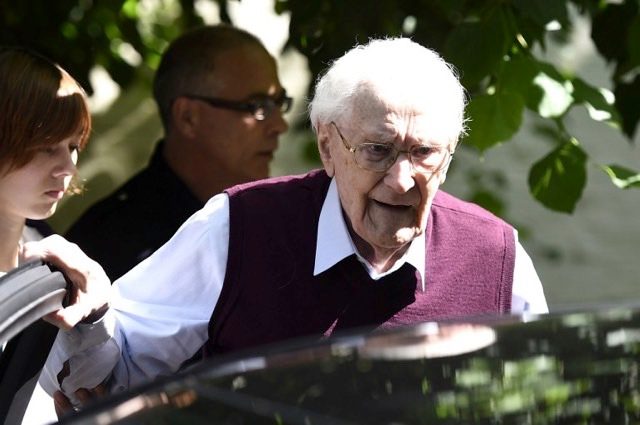SUMMARY
This is AI generated summarization, which may have errors. For context, always refer to the full article.

LUENEBURG, Germany – A German court Wednesday, July 15, sentenced a former Nazi SS officer known as the “Bookkeeper of Auschwitz” to four years in jail, in what was expected to be one of the last Holocaust trials.
Oskar Groening, 94, sat impassively in the packed courtroom as judge Franz Kompisch said “the defendant is found guilty of accessory to murder in 300,000 legally connected cases” of Hungarian Jews sent to the gas chambers from May to July 1944.
He said Groening had willingly taken a “safe desk job” in “a machinery designed entirely for the killing” of human beings, a system that by any standard was “inhumane and all but unbearable for the human psyche”.
Groening served as an accountant at Auschwitz in Nazi-occupied Poland, sorting and counting the money taken from those killed or used as slave labor, and shipping it back to his Nazi superiors in Berlin.
He also on several occasions performed “ramp duty,” processing deportees as they arrived by rail in cattle cars.
The sentence was longer than the three and a half years prosecutors had demanded in the high-profile case which opened in April in the northern city of Lueneburg.
Groening on Tuesday seized a last opportunity to address the judges and said he was “very sorry” for his time stationed at the concentration camp.
“No one should have taken part in Auschwitz,” he said, his voice wavering.
“I know that. I sincerely regret not having lived up to this realization earlier and more consistently.”
Unlikely to serve time
Defense attorney Hans Holtermann said he would review the verdict before deciding whether to appeal.
But court observers said it was unlikely Groening, who was not in custody during the trial, would ever serve time in prison given his advanced age and deteriorating health.
A medical team will evaluate whether Groening is physically capable of withstanding incarceration, and any sentence would only begin after any appeals are heard, prosecution spokeswoman Kathrin Soefker said.
“He can go home today as he normally would,” she said.
Holocaust survivors and victims’ relatives who were co-plaintiffs welcomed the verdict as a “very late step toward justice”.
“SS members such as Groening who took part in the murder of our families have created lifelong and unbearable suffering for us,” they said in a statement.
“Neither the criminal proceedings nor the words of the accused can alleviate this suffering. But it gives us satisfaction that now the perpetrators cannot evade prosecution as long as they live.”
Some 1.1 million people, most of them European Jews, perished between 1940 and 1945 in the Auschwitz-Birkenau camp before it was liberated by Soviet forces.
‘Monstrous, unspeakable crime’
Groening acknowledged “moral guilt” during the trial but said it was up to the court to rule on his legal culpability.
He had testified twice that he was so horrified by the crimes he witnessed at the camp after his arrival in 1942 that he appealed three times for a transfer to the front, which was not granted until autumn 1944.
The court heard harrowing testimony from more than a dozen Holocaust survivors, some coming from North America to have their day in court.
Because Kompisch made the surprise decision only Tuesday to deliver the verdict on Wednesday, many of the elderly witnesses were unable to fly to Germany in time.
However Leon Schwarzbaum, 94, who was held prisoner at Auschwitz for two years, raced from his home in Berlin to attend.
“I do not want revenge but I find it to be a fair verdict,” he said outside the courtroom.
Asked whether he could forgive Groening, Schwarzbaum said: “No, because 30 members of my family were murdered.”
While some co-plaintiffs expressed disappointment that Groening failed to apologize to them, others spoke of a kind of catharsis from the trial.
“We were able to bear witness about the monstrous and unspeakable crime committed against us and our families,” the survivors said.
Groening had previously been cleared after lengthy criminal probes dating back to the 1970s. But the 2011 trial of former death camp guard John Demjanjuk said a new precedent.
While previously courts had punished defendants for individual atrocities, Demjanjuk was convicted solely on the basis of having worked at the Sobibor camp in occupied Poland. He died in 2012 before his appeal could be heard.
Kompisch said it was “scandalous” that it had taken so long for Germany to deal with such cases. He noted that of 6,500 people who worked at Auschwitz known to authorities, only 49 were ever convicted.
The head of the federal office investigating Nazi-era crimes, Kurt Schrimm, told the Bild newspaper this month that other probes of former camp guards were still ongoing, although “many had to be terminated because the accused had died or were no longer capable of standing trial.” – Deborah Cole, AFP/Rappler.com
Add a comment
How does this make you feel?
There are no comments yet. Add your comment to start the conversation.